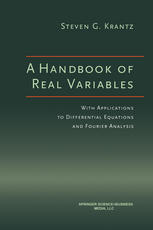

Most ebook files are in PDF format, so you can easily read them using various software such as Foxit Reader or directly on the Google Chrome browser.
Some ebook files are released by publishers in other formats such as .awz, .mobi, .epub, .fb2, etc. You may need to install specific software to read these formats on mobile/PC, such as Calibre.
Please read the tutorial at this link: https://ebookbell.com/faq
We offer FREE conversion to the popular formats you request; however, this may take some time. Therefore, right after payment, please email us, and we will try to provide the service as quickly as possible.
For some exceptional file formats or broken links (if any), please refrain from opening any disputes. Instead, email us first, and we will try to assist within a maximum of 6 hours.
EbookBell Team

5.0
48 reviewsThe subject of real analysis dates to the mid-nineteenth century - the days of Riemann and Cauchy and Weierstrass. Real analysis grew up as a way to make the calculus rigorous. Today the two subjects are intertwined in most people's minds. Yet calculus is only the first step of a long journey, and real analysis is one of the first great triumphs along that road. In real analysis we learn the rigorous theories of sequences and series, and the profound new insights that these tools make possible. We learn of the completeness of the real number system, and how this property makes the real numbers the natural set of limit points for the rational numbers. We learn of compact sets and uniform convergence. The great classical examples, such as the Weierstrass nowhere-differentiable function and the Cantor set, are part of the bedrock of the subject. Of course complete and rigorous treatments of the derivative and the integral are essential parts of this process. The Weierstrass approximation theorem, the Riemann integral, the Cauchy property for sequences, and many other deep ideas round out the picture of a powerful set of tools.